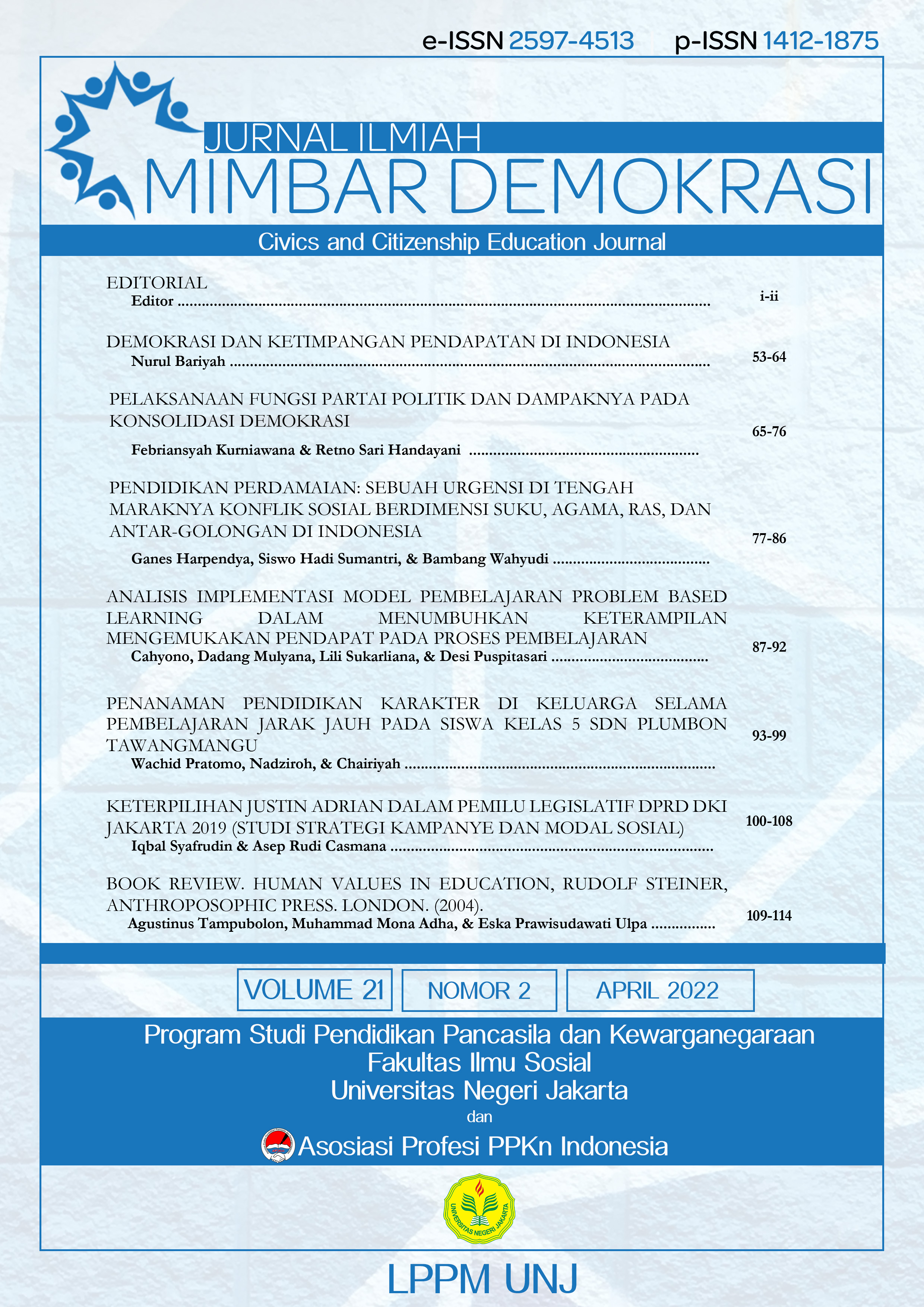Keterpilihan justin adrian dalam pemilu legislatif DPRD DKI Jakarta 2019 (studi strategi kampanye dan modal sosial)
Justin Adrian election in the 2019 DKI Jakarta DPRD legislative election (study on campaign strategy and social capital).
DOI:
https://doi.org/10.21009/jimd.v21i2.26314Keywords:
Pendidikan Politik, Strategi Politik, Strategi Kampanye, Legislatif, Political Education, Strategy, Campaign, LegislativeAbstract
Abstract: The purpose of this study is to determine the campaign strategy in the DKI Jakarta Legislative general election held in 2019. The research method used is qualitative with a case study approach. This method is appropriate because it tries to examine the main strategies for the publication process and win Justin Adrian. The data collection technique used was in-depth interviews with 10 people consisting of one elected DPRD member and nine party administrators. The results of this study indicate that there are two main strategies, namely social capital and a door-to-door campaign strategy to direct voters. The conclusion is that in order to win the election, one needs to have a special strategy. This research has an impact on the community to be able to find out about strategies when conducting legislative elections
Abstrak: Tujuan dari penelitian ini adalah untuk mengetahui strategi kampanye dalam pemilihan umum Legislatif DKI Jakarta yang dilaksanakan pada tahun 2019. Metode penelitian yang digunakan adalah Kualitatif dengan pendekatan studi kasus. Metode ini tepat karena mencoba menelaah strategi utama untuk proses publikasi dan memenangkan Justin Adrian. Teknik pengumpulan data yang digunakan adalah dengan wawancara yang mendalam terhadap 10 orang yang terdiri dari satu orang anggota DPRD terpilih dan sembilan orang pengurus partai. Hasil penelitian ini menunjukan bahwa terdapat dua strategi utama, yaitu modal sosial dan strategi kampanye door-to-door terhadap pemilih secara langsung. Kesimpulannya adalah untuk dapat memenangkan pemilu, maka seseorang perlu memiliki strategi khusus. Penelitian ini memiliki impact terhadap masyarakat untuk dapat mengetahui tentang strategi ketika melakukan pemilihan umum legislative.
References
Atkinson, V., Aaberg, R., & Darnolf, S. (2017). Disability rights and election observation: Increasing access to the political process. Nordic Journal of Human Rights, 35(4), 375– 391. https://doi.org/10.1080/18918131.2017.1400348.
Budi, A. (2020). Less democracy, more centralism: the selection of Candidates by Golkar and PDIP in Indonesian subnational executive elections, 2005–2020. Asian Journal of Political Science, 28(3), 236–255. https://doi.org/10.1080/02185377.2020.1774909.
Buehler, M., & Nataatmadja, R. (2019). A research agenda for studying legislative incumbent turnover in new democracies, using Indonesia as a case study. South East Asia Research, 27(3), 203–224. https://doi.org/10.1080/0967828X.2019.1642027.
Buehler, M., & Nataatmadja, R. (2020). Authoritarian diasporas in Indonesia and the Philippines: comparative perspectives on elite survival and defection. Democratization, 0(0), 1–18. https://doi.org/10.1080/13510347.2020.1832084.
Caraway, T. L., Ford, M., & Nugroho, H. (2015). Translating membership into power at the ballot box? Trade union candidates and worker voting patterns in Indonesia’s national elections. Democratization, 22(7), 1296–1316. https://doi.org/10.1080/13510347.2014.930130.
De Giorgi, E., & Santana-Pereira, J. (2016). The 2015 Portuguese Legislative Election: Widening the Coalitional Space and Bringing the Extreme Left in. South European Society and Politics, 21(4), 451–468. https://doi.org/10.1080/13608746.2016.1181862.
Febriansyah, M., Ismail, M. T., & Noor, N. M. (2020). Competing not complementing: KPU, Bawaslu, and the dynamic of election monitoring in PEMILU 2019. Asian Journal of Political Science, 0(0), 1–19. https://doi.org/10.1080/02185377.2020.1781670.
Fionna, U., & Hutchinson, F. E. (2019). Indonesia’S 2019 Elections: a Fractured Democracy? Asian Affairs, 50(4), 502–519. https://doi.org/10.1080/03068374.2019.1672400.
Fossati, D., & Martinez i Coma, F. (2020). Exploring citizen turnout and invalid voting in Indonesia: two sides of the same coin? Contemporary Politics, 26(2), 125–146. https://doi.org/10.1080/13569775.2019.1690210.
Gueorguiev, D., Ostwald, K., & Schuler, P. (2018). Rematch: Islamic politics, mobilisation, and the Indonesian presidential election. Political Science, 70(3), 240–252. https://doi.org/10.1080/00323187.2019.1584733.
Harish, S. P., & Toha, R. (2019). A new typology of electoral violence: insights from Indonesia. Terrorism and Political Violence, 31(4), 687–711. https://doi.org/10.1080/09546553.2016.1277208.
Lewis, B. D. (2020). How do mayors get elected? The causal effects of pre-electoral coalitions on mayoral election outcomes in Indonesia. Local Government Studies, 46(3), 394–413. https://doi.org/10.1080/03003930.2019.1627334.
McRae, D., & Robet, R. (2020). Don’t ask, don’t tell: academics and electoral politics in Indonesia. Contemporary Politics, 26(1), 38–59. https://doi.org/10.1080/13569775.2019.1627736.
Medina, I., & Correa, P. (2016). The 2015 Spanish election: the times they are a’changing. Regional & Federal Studies, 26(3), 407-417.
Milanese, J. P., & Manfredi, L. C. (2018). Nationalization of the Legislative Vote, Visibility and Reputation in the Written Press: An Analysis of Candidates’ Strategies for the 2014 Colombian Senate Election. Journal of Iberian and Latin American Research, 24(3), 199–213. https://doi.org/10.1080/13260219.2019.1623289.
Moulds, S. (2020). A deliberative approach to post legislative scrutiny? Lessons from Australia’s ad hoc approach. Journal of Legislative Studies, 26(3), 362–386. https://doi.org/10.1080/13572334.2020.1738687.
Nimmo, D. D. (1978). Political communication and public opinion in America. Goodyear Publishing Company.
Salahudin, Nurmandi, A., Jubba, H., Qodir, Z., Jainuri, & Paryanto. (2020). Islamic Political Polarisation on Social Media During the 2019 Presidential Election in Indonesia. Asian Affairs, 51(3), 656–671. https://doi.org/10.1080/03068374.2020.1812929.
Sözen, A., & Sonan, S. (2019). Yet Another Case of Electoral and Government Epidemic? The Turkish Cypriot Legislative Election of January 2018. South European Society and Politics, 24(1), 129–154. https://doi.org/10.1080/13608746.2018.1537175.
Stockton, H., & Yap, O. F. (2015). Strategic Party Choices in Emergent Democracies: Taiwan’S 2008 Legislative Election. Representation, 51(2), 219–237. https://doi.org/10.1080/00344893.2015.1061042.
Tawakkal, G. T. I., Damayanti, R., Subekti, T., Alfian, F., & Garner, A. D. (2020). Social networks and brokerage behavior in Indonesian elections: Evidence from Central Java. Asian Affairs (UK), 47(3), 226–243. https://doi.org/10.1080/00927678.2020.1765473.
Weng, L. C. D. (2015). Contextual Effects on Individual Voting Behavior: The Case of Taiwan. Asian Journal of Political Science, 23(3), 321–345. https://doi.org/10.1080/02185377.2015.1073602.
Xue, S. (2018). Ethnic mobilization in 2015 local elections in North Sumatra, Indonesia. Asian Ethnicity, 19(4), 509–527. https://doi.org/10.1080/14631369.2018.1433021.
Yin, R. K. (2004). The case study anthology. Sage.








